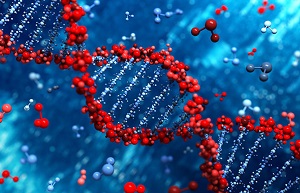Austrian Study Discovers That Genetic Variants Of The Host CD16a Antibody Receptor Are Associated With The Risk Of Severe COVID-19
Source: Medical News - Host Genetic Variants May 13, 2022 2 years, 11 months, 1 week, 6 days, 5 hours, 14 minutes ago
A new study by researchers from the Medical University of Vienna-Austria have found that genetic variants of the host CD16a antibody receptor are associated with the risk of severe COVID-19.

It was already long suspected that host genetic variants in activating natural killer (NK) cell receptors may contribute to differences in severity of COVID-19. NK cell-mediated antibody-mediated cellular cytotoxicity (ADCC) responses play, however, a controversial role in SARS-CoV-2 infections. It is unclear whether proinflammatory and cytotoxic SARS-CoV-2-specific ADCC responses limit disease severity or rather contribute to the immunopathogenesis of severe COVID-19.
The study team utilizing a genetic association approach and subsequent in vitro antibody-dependent NK cell activation experiments, investigated whether genetic variants in the FcγRIIIa-encoding FCGR3A gene, resulting in expression of either a low-affinity or high-affinity variant, and individual SARS-CoV-2-specific ADCC response contribute to COVID-19 severity.
Interestingly, the study findings showed that the high-affinity variant of the FcγRIIIa receptor, 158-V/V, is significantly over-represented in hospitalized and deceased patients with COVID-19, whereas the low-affinity FcγRIIIa-158-F/F variant occurs more frequently in patients with mild COVID-19 (P < .0001).
Subsequent functional SARS-CoV-2 antibody-specific NK cell-mediated ADCC assays revealed that significantly higher proinflammatory ADCC responses occur in hospitalized patients with COVID-19, and are especially observed in NK cells expressing the FcγRIIIa-158-V/V variant (P < .0001).
The study findings provide evidence that pronounced SARS-CoV-2-specific NK cell-mediated ADCC responses are influenced by NK cell FcγRIIIa genetic variants and are a hallmark of severe COVID-19.
The study findings were published in the peer reviewed journal: Genetics in Medicine.
https://www.gimjournal.org/article/S1098-3600(22)00722-5/fulltext
It has long been suspected that distinct genetic variants significantly influence an individual's immune response to the SARS-CoV-2 virus and may influence the COVID-19 disease severity. The study team was able to demonstrate that distinct genetic variants of the CD16a antibody receptor are associated with the risk of severe COVID-19.
Importantly, this affects about 15% of the global population.
The NK cells (Natural killer cells) play a significant role in combating the viral replication in the initial stages of viral infections. NK cells have specialized receptors on their surface that bind to antibodies that are specifically produced against viruses. This enables the antibody-dependent activation of killer cells (ADCC), which leads to the destruction of virus-infected cells and triggers the release of pro-inflammatory factors.
However, this interaction between antibodies and the NK cell surface receptor is influenced by certain genetic factors, resulting in either strongly (high-affinity) or weakly (low-affinity) binding genetic receptor variants.
The study team led by Dr Hannes Vietzen and Dr Elisabeth Puchhammer-Stöckl from the Center for Virology of the Medical University of Vienna in collaboration with Dr A
lexander Zoufaly from the Favoriten hospital, has now shown that certain genetic variants of the CD16a antibody receptor are associated with the risk of severe COVID-19.
The study team showed that individuals who had to be hospitalized with severe COVID-19 were significantly more likely to have the high-affinity variant of the CD16a receptor. This high-affinity variant only occurs in around 15% of the population, and carriers of this variant have a significantly higher risk of developing severe COVID-19. This high-affinity variant was particularly common in COVID-19 patients who had to be treated in intensive care units or who died from COVID-19.
The study team was able to show in subsequent cell culture experiments that this high-affinity variant of the antibody receptor results in a significantly elevated antibody-dependent activation of NK cells and in a particularly strong release of pro-inflammatory factors.
Corresponding and lead author Dr Hannes Vietzen told Thailand
Medical News, "The antibody-dependent activation of NK cells is a delayed immune response. It now appears that this particular immune response no longer helps to control the SARS-CoV-2 viral replication but aggravates the course of COVID-19 disease by triggering an exaggerated immune response."
All the tests involved are special scientific assays. Routine laboratory testing for these parameters is not being considered, since there are currently no therapeutic or preventive options targeting this genetic predisposition to reduce the risk of severe COVID-19.
It should also be noted that genetic predisposition is further only one of several factors that influence the severity of the disease.
Thailand
Medical News would further like to add that currently studies are underway on the usage of Genistein-an isoflavone compound found in soybean and its metabolite-genistein glucuronide along with the phytochemicals Ingenol mebutate (IM), also known as ingenol-3-angelate isolated from the plant Euphorbia peplus and β-Cryptoxanthin isolated from the plant Fortunella crassifolia to help downregulate the expression of the high-affinity variant of the FcγRIIIa receptor, 158-V/V.
For more on Human Host Genetic Variants And COVID-19 Severity, keep on logging to Thailand
Medical News.
